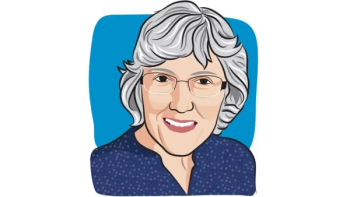
- Fall 2019
- Volume 1
- Issue 1
Testing for Honesty
Before getting genetic testing for hereditary ovarian, breast or other cancers, make sure the company providing it is both reputable and qualified.
There is a flood of information about genetic tests for cancer risk being offered in the media and even at senior centers, churches and community fairs. If these promotions have caught your attention, consider some key facts before you pursue genetic testing.
The results of these tests can provide important, potentially lifesaving information to people who have had ovarian, breast or certain other cancers; have a family history of these diseases; or have relatives with known cancer-causing gene mutations — if it is done in the right way. If you are considering genetic testing to learn more about cancer risk or have already received results, speaking with a genetic counselor, doctor or other health care provider who has advanced training in genetics is crucial. This is the most reliable way to obtain and understand information about your risk.
With the growing interest and availability of genetic testing, there has been a striking uptick in advertisements and sales representatives aggressively promoting genetic tests directly to consumers at community events, on Facebook and in other nonmedical settings. The vast majority of these salespeople and “health advocates” have no medical background and little or no training in genetics. These marketing representatives often target the Medicare population. Some are evasive about the lab performing the testing, and most provide misleading information, with false promises of “free” genetic testing to people who do not qualify. Ultimately, unwitting consumers may hand over sensitive information such as their health insurance ID number and social security number, enabling fraudulent billing of insurance companies — or worse.
BENEFITS OF TESTING
BRCA 1 or 2 mutations can be carried by men or women and have a 50% chance of being passed to one’s children. In women, the mutations significantly increase the risk of ovarian and breast cancers. Men who carry BRCA2 mutations have a higher risk of breast and prostate cancers. Both genders with these mutations are predisposed to pancreatic and other cancers.
Importantly, the BRCA testing requirement under the ACA does not apply to men or people who are covered by Medicare or Medicaid. In fact, a Medicare policy implemented in late 2018 severely restricts genetic testing for hereditary cancer mutations. In most cases, it covers testing only for people with “recurrent, relapsed, refractory, metastatic or advanced stage 3 or 4 cancer who are seeking additional treatment.” Even before this policy took effect, Medicare rarely covered multigene panel testing for cancer survivors, and it has never covered genetic testing for previvors, or those with a strong predisposition to cancer but no diagnosis.
TAKING PRECAUTIONS
Contrary to the language in most health insurance policies, fraudulent businesses claim that the test panels they offer are free to people who have certain coverage. Although genetic counseling and testing for a BRCA gene mutation is considered an essential health benefit for certain women under the Affordable Care Act (ACA), the tests offered by these companies for hereditary cancer genes, as well as pharmacogenetic tests that seek genetic variations affecting response to or metabolism of drugs, are rarely covered at 100% — if they are covered at all.
Despite complaints filed with the Federal Trade Commission, the Office of Inspector General and state attorneys general, the number of unscrupulous companies is growing. These businesses:
- Take advantage of people by misinforming them about their need and eligibility for hereditary cancer genetic testing.
- Provide a medical service without the expertise of qualified health care providers.
- Commit fraud by stealing personal information and/or billing insurers for services not provided.
- Mock the very serious issues around genetic testing and carrying an inherited mutation associated with increased risk of cancer.
- Do incomplete testing or do not fully explain the results or offer direction for follow-up.
Health advocates, pyramid marketing representatives and insurance salespeople (talk about a conflict of interest!) should not be involved in genetic testing, even if it is just a cheek swab. Too much rides on the results.
So, please, talk to your family members, friends and neighbors. Warn them about bad actors and fraud. If they are interested in genetic testing, encourage them to seek out trustworthy medical professionals to provide guidance and expertise. The best place to start is with a primary care doctor, OB-GYN or oncologist. The patient advocacy organization Facing Our Risk of Cancer Empowered (FORCE) website also offers information on
LISA SCHLAGER is vice president of public policy for Facing Our Risk of Cancer Empowered (FORCE), an organization that supports the high-risk cancer community. She developed the FORCE Research Advocate Training program and spearheads the organization’s legislative and regulatory advocacy efforts by tracking and engaging in key issues, ensuring that the interests of this community are represented. Schlager also serves in leadership positions for other cancer and patient-focused health care initiatives. A carrier of the BRCA1 gene mutation, she lives in the Washington, D.C. area with her husband, two teenage children and dog.
Articles in this issue
over 6 years ago
Hitting the Spot in Squamous Cell Carcinomaover 6 years ago
As Large As Life: Using Artificial Intelligence in Cancer Careover 6 years ago
Bonded for Lifeover 6 years ago
Putting the Ball In Your Court With Cancer Coachesover 6 years ago
Going to the Dogsover 6 years ago
Grants Offer Caregivers a Day of Restover 6 years ago
Hiring a Cancer Coach: What You Should Know


